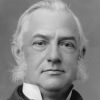He who knows one, knows none.
Max Müller (1823-1900) German-British philologist, Orientalist, religious studies founder
“The Science of Religion,” Lecture 1, Royal Institution (19 Feb 1870), Lectures on the Science of Religion (1872)
(Source)
Regarding religion, paraphrasing Goethe on language ("He who knows one language, knows none").
Quotations by:
Muller, Max
All truth is safe, and nothing else is safe; and he who keeps back the truth, or withholds it from men, from motives of expediency, is either a coward or a criminal, or both.
Max Müller (1823-1900) German-British philologist, Orientalist, religious studies founder
(Attributed)
(Source)
This is frequently cited to Muller's The Science of Religion (1872), a collection of lectures, but does not appear there. The earliest reference seems to be in the Introduction and advertisements of T. W. Doane, Bible Myths and their Parallels in Other Religions (1882). While most of the block of text Doane attributes to Muller can be found in Muller's Lecture 1, this phrase does not.
Whether listening to the shrieks of the Shaman sorcerers of Tatary, or to the odes of Pindar, or to the sacred songs of Paul Gerhard; whether looking at the pagodas of China, or the Parthenon of Athens, or the cathedral of Cologne; whether reading the sacred books of the Buddhists, of the Jews, or of those who worship God in spirit and in truth, we ought to be able to say, like the Emperor Maximilian, “Homo sum, humani nihil a me alienum puto;” or, translating his words somewhat freely, “I am a man; nothing pertaining to man I deem foreign to myself.”
Max Müller (1823-1900) German-British philologist, Orientalist, religious studies founder
Chips from a German Workshop, “Lecture on the Vedas” (1866)
(Source)
If there is one thing which a comparative study of religions places in the clearest light, it is the inevitable decay to which every religion is exposed. It may seem almost like a truism, that no religion can continue to be what it was during the lifetime of its founder and its first apostles. Yet it is but seldom borne in mind that without constant reformation, i.e. without a constant return to its fountain-head, every religion, even the most perfect, nay the most perfect on account of its very perfection, more even than others, suffers from its contact with the world, as the purest air suffers from the mere fact of its being breathed.
Max Müller (1823-1900) German-British philologist, Orientalist, religious studies founder
Chips from a German Workshop, Preface (1866)
(Source)
It is necessary that we too should see the beam in our own eyes, and learn to distinguish between the Christianity of the nineteenth century and the religion of Christ. If we find that the Christianity of the nineteenth century does not win as many hearts in India and China as it ought, let us remember that it was the Christianity of the first century in all its dogmatic simplicity, but with its overpowering love of God and man, that conquered the world and superseded religions and philosophies, more difficult to conquer than the religious and philosophical systems of Hindus and Buddhists.
Max Müller (1823-1900) German-British philologist, Orientalist, religious studies founder
Chips from a German Workshop, Preface (1866)
(Source)
He must be a man of little faith, who would fear to subject his own religion to the same critical tests to which the historian subjects all other religions. We need not surely crave a tender or merciful treatment for that faith which we hold to be the only true one. We should rather challenge it for the severest tests and trials, as the sailor would for the good ship to which he trusts his own life, and the lives of those who are dear to him. In the Science of Religion, we can decline no comparisons, nor claim any immunities for Christianity, as little as the missionary can, when wrestling with the subtle Brahmin, or the fanatical Mussulman, or the plain speaking Zulu.
Max Müller (1823-1900) German-British philologist, Orientalist, religious studies founder
Chips from a German Workshop, vol. 1, Preface (1866)
(Source)
The position which believers and unbelievers occupy with regard to their various forms of faith is very much the same all over the world. The difficulties which trouble us, have troubled the hearts and minds of men as far back as we can trace the beginnings of religious life. The great problems touching the relation of the Finite to the Infinite, of the human mind as the recipient, and of the Divine Spirit as the source of truth, are old problems indeed; and while watching their appearance in different countries, and their treatment under varying circumstances, we shall be able, I believe, to profit ourselves, both by the errors which others committed before us, and by the truth which they discovered. We shall know the rocks that threaten every religion in this changing and shifting world of ours, and having watched many a storm of religious controversy and many a shipwreck in distant seas, we shall face with greater calmness and prudence the troubled waters at home.
Max Müller (1823-1900) German-British philologist, Orientalist, religious studies founder
Chips from a German Workshop, Vol. 1, Preface (1866)
(Source)

